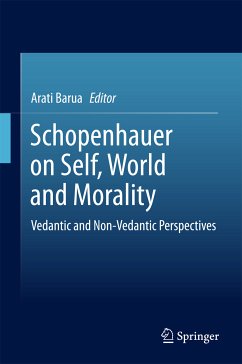Schopenhauer on Self, World and Morality (eBook, PDF)
Vedantic and Non-Vedantic Perspectives
Redaktion: Barua, Arati
40,95 €
inkl. MwSt.
Sofort per Download lieferbar

20 °P sammeln
Schopenhauer on Self, World and Morality (eBook, PDF)
Vedantic and Non-Vedantic Perspectives
Redaktion: Barua, Arati
- Format: PDF
- Merkliste
- Auf die Merkliste
- Bewerten Bewerten
- Teilen
- Produkt teilen
- Produkterinnerung
- Produkterinnerung

Bitte loggen Sie sich zunächst in Ihr Kundenkonto ein oder registrieren Sie sich bei
bücher.de, um das eBook-Abo tolino select nutzen zu können.
Hier können Sie sich einloggen
Hier können Sie sich einloggen
Sie sind bereits eingeloggt. Klicken Sie auf 2. tolino select Abo, um fortzufahren.

Bitte loggen Sie sich zunächst in Ihr Kundenkonto ein oder registrieren Sie sich bei bücher.de, um das eBook-Abo tolino select nutzen zu können.
Includes contributions from Schopenhauer experts across the world
Focuses on a less read area of Schopenhauer's deep and abiding interest in the Upanishads and Indic philosophy
Provides insights about the influence of Indic philosophical texts on Schopenhauer, and about his influence on modern Indian philosophers
- Geräte: PC
- ohne Kopierschutz
- eBook Hilfe
- Größe: 2.34MB
Andere Kunden interessierten sich auch für
![The Palgrave Schopenhauer Handbook (eBook, PDF) The Palgrave Schopenhauer Handbook (eBook, PDF)]() The Palgrave Schopenhauer Handbook (eBook, PDF)191,95 €
The Palgrave Schopenhauer Handbook (eBook, PDF)191,95 €![Hegel in the Arab World (eBook, PDF) Hegel in the Arab World (eBook, PDF)]() Lorella VenturaHegel in the Arab World (eBook, PDF)44,95 €
Lorella VenturaHegel in the Arab World (eBook, PDF)44,95 €![Schelling's Reception in Nineteenth-Century British Literature (eBook, PDF) Schelling's Reception in Nineteenth-Century British Literature (eBook, PDF)]() Giles WhiteleySchelling's Reception in Nineteenth-Century British Literature (eBook, PDF)46,95 €
Giles WhiteleySchelling's Reception in Nineteenth-Century British Literature (eBook, PDF)46,95 €![McDowell and Hegel (eBook, PDF) McDowell and Hegel (eBook, PDF)]() McDowell and Hegel (eBook, PDF)96,95 €
McDowell and Hegel (eBook, PDF)96,95 €![Handbuch Deutscher Idealismus (eBook, PDF) Handbuch Deutscher Idealismus (eBook, PDF)]() Handbuch Deutscher Idealismus (eBook, PDF)59,99 €
Handbuch Deutscher Idealismus (eBook, PDF)59,99 €![Charles Taylor, Michael Polanyi and the Critique of Modernity (eBook, PDF) Charles Taylor, Michael Polanyi and the Critique of Modernity (eBook, PDF)]() Charles Taylor, Michael Polanyi and the Critique of Modernity (eBook, PDF)80,95 €
Charles Taylor, Michael Polanyi and the Critique of Modernity (eBook, PDF)80,95 €![Schopenhauer und die Deutung der Existenz (eBook, PDF) Schopenhauer und die Deutung der Existenz (eBook, PDF)]() Schopenhauer und die Deutung der Existenz (eBook, PDF)79,95 €
Schopenhauer und die Deutung der Existenz (eBook, PDF)79,95 €-
-
-
Includes contributions from Schopenhauer experts across the world
Focuses on a less read area of Schopenhauer's deep and abiding interest in the Upanishads and Indic philosophy
Provides insights about the influence of Indic philosophical texts on Schopenhauer, and about his influence on modern Indian philosophers
Focuses on a less read area of Schopenhauer's deep and abiding interest in the Upanishads and Indic philosophy
Provides insights about the influence of Indic philosophical texts on Schopenhauer, and about his influence on modern Indian philosophers
Dieser Download kann aus rechtlichen Gründen nur mit Rechnungsadresse in A, B, BG, CY, CZ, D, DK, EW, E, FIN, F, GR, HR, H, IRL, I, LT, L, LR, M, NL, PL, P, R, S, SLO, SK ausgeliefert werden.
Produktdetails
- Produktdetails
- Verlag: Springer Nature Singapore
- Seitenzahl: 184
- Erscheinungstermin: 5. Januar 2018
- Englisch
- ISBN-13: 9789811059544
- Artikelnr.: 53063679
- Verlag: Springer Nature Singapore
- Seitenzahl: 184
- Erscheinungstermin: 5. Januar 2018
- Englisch
- ISBN-13: 9789811059544
- Artikelnr.: 53063679
- Herstellerkennzeichnung Die Herstellerinformationen sind derzeit nicht verfügbar.
Arati Barua is Associate Professor of Philosophy, Deshbandhu College, University of Delhi, and the Founder Director of the Indian division of the Schopenhauer Society (IDSS), under the International Schopenhauer Society in Germany. Besides being a member of various academic societies such as the Schopenhauer Gesellschaft, Germany, North American division of Schopenhauer Society (NADSS), USA and Indian Association for Canadian Studies (IACS), India, she is also a member of the Scientific Advisory Board of the Schopenhauer Jahrbuch, Germany. She was awarded a Faculty Research Fellowship by the Shastri Indo-Canadian Institute (SICI) to work on her project, "George Grant and M. K. Gandhi on technology and modernism", at the university of Guelph, Ontario. In 2006, she was awarded a Deutsche Forschungsgemeinschaft (DFG) fellowship by the German Research Foundation, Germany for her project on "Sankara and Schopenhauer: A comparative study", to work at the Schopenhauer Research Center,Johannes Gutenberg University, Mainz, Germany. She has published several books on Schopenhauer, and was recently conferred the prestigious national award "Bharat Excellence 2016", by the Friendship Forum of India (FFI) at New Delhi in recognition of excellence in her field of activity and enhancing the image of India. Dr Barua has also been awarded with "Bharat Jyoti Award 2015" and "Best Citizens of India 2015" by different institutions in India.
Chapter 1. Introducing Schopenhauer's Philosophy of the World, Self and Morality in the light of Vedantic and Non-Vedantic Wisdom Arati Barua.- Chapter 2. Some Remarks on the Present State of Research on Schopenhauer and Indian philosophy M. Kossler. Part I Schopenhauer, the Vedas and Vedantas. I.I Self, World and Morality.- Chapter 3. Self, World and Morality: Schopenhauer, Wittgenstein and Vedanta R. C. Pradhan.- Chapter 4. The Upanishadic Views on Self, World and Morality: An Assessment with Special Reference to Arthur Schopenhauer Jayantee Priyadarshini Sahoo.- Chapter 5. Schopenhauer's comments on morality in the Oupnek'hat Mitri Martina Kurbel. I.II Schopenhauer and the Vedas.- Chapter 6. The Quintessence of the Upanishadic Wisdom and the Solace of Schopenhauer's life K. M. Pathak.- Chapter 7. Reason, Emotion and Beyond: Revisiting Schopenhauer, Bhartrhari and Abhinavagupta Ajay Verma.- Chapter 8. Circumscribing the Meeting of Schopenhauer and the Vedas: Gaudapada, Sankara and Vedanta Manish Sharma. Part II Schopenhauer and Buddhism.- Chapter 9. Compassion and solidarity in Schopenhauer and the Upanishads Thomas Regehly.- Chapter 10 On the "Philosophy of Saintliness": K. E. Neumann's German Translations of the Buddha's Discourses and Schopenhauer's Philosophy Stephan Atzert.- Part III Schopenhauer and Tagore.- Chapter 11 Schopenhauer and Tagore on the " Vanity of existence": A parallel and comparative study S. Ray.- Chapter 12. Overcoming principium individuationis: Schopenhauer and Tagore Indu Sarin. Part IV Schopenhauer, Wittgenstein and Aurobindo.- Chapter 13. Journey from Pessimism to Optimism in Schopenhauer, Wittgenstein and Tagore's philosophy Bhaskar Bhattacaryya.- Chapter 14. Will to live or no-will to live? The points of convergence of the thoughts of Schopenhauer, Wittgenstein, and Aurobindo on living a meaningful life K. C. Pandey. Bibliography. Index.
Chapter 1. Introducing Schopenhauer's Philosophy of the World, Self and Morality in the light of Vedantic and Non-Vedantic Wisdom Arati Barua.- Chapter 2. Some Remarks on the Present State of Research on Schopenhauer and Indian philosophy M. Kossler. Part I Schopenhauer, the Vedas and Vedantas. I.I Self, World and Morality.- Chapter 3. Self, World and Morality: Schopenhauer, Wittgenstein and Vedanta R. C. Pradhan.- Chapter 4. The Upanishadic Views on Self, World and Morality: An Assessment with Special Reference to Arthur Schopenhauer Jayantee Priyadarshini Sahoo.- Chapter 5. Schopenhauer's comments on morality in the Oupnek'hat Mitri Martina Kurbel. I.II Schopenhauer and the Vedas.- Chapter 6. The Quintessence of the Upanishadic Wisdom and the Solace of Schopenhauer's life K. M. Pathak.- Chapter 7. Reason, Emotion and Beyond: Revisiting Schopenhauer, Bhartrhari and Abhinavagupta Ajay Verma.- Chapter 8. Circumscribing the Meeting of Schopenhauer and the Vedas: Gaudapada, Sankara and Vedanta Manish Sharma. Part II Schopenhauer and Buddhism.- Chapter 9. Compassion and solidarity in Schopenhauer and the Upanishads Thomas Regehly.- Chapter 10 On the "Philosophy of Saintliness": K. E. Neumann's German Translations of the Buddha's Discourses and Schopenhauer's Philosophy Stephan Atzert.- Part III Schopenhauer and Tagore.- Chapter 11 Schopenhauer and Tagore on the " Vanity of existence": A parallel and comparative study S. Ray.- Chapter 12. Overcoming principium individuationis: Schopenhauer and Tagore Indu Sarin. Part IV Schopenhauer, Wittgenstein and Aurobindo.- Chapter 13. Journey from Pessimism to Optimism in Schopenhauer, Wittgenstein and Tagore's philosophy Bhaskar Bhattacaryya.- Chapter 14. Will to live or no-will to live? The points of convergence of the thoughts of Schopenhauer, Wittgenstein, and Aurobindo on living a meaningful life K. C. Pandey. Bibliography. Index.







